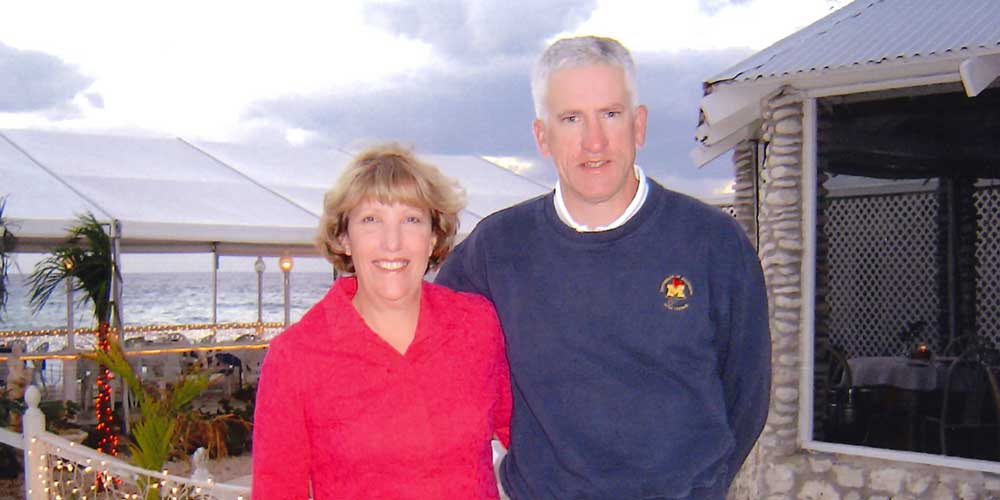Susan and Michael Mosher

“We believe in the mission of the center and its approach to studying neurologic diseases,” Michael says. “We’ve toured the center on more than one occasion and found the researchers to be extremely dedicated to their work. We knew we could make an impact by supporting their promising research and wanted to inspire the next generation to be philanthropic.”
While they’re a rarity today, house calls were once the norm in healthcare. But a doctor who comes right to your seat at Fenway Park? Now that’s a different ball game altogether.
This is exactly what happened one Friday evening for Susan and Michael Mosher. The couple were watching a Red Sox game at Fenway when Michael, who has Parkinson’s disease, began to experience movement issues. When Susan called her husband’s neurologist, Allan Ropper, MD, to line up an appointment with him for Monday, Ropper answered and quickly asked, “Where are you?”
It didn’t take long for them to realize they were all at the same Red Sox game—prompting Ropper to head straight to the Moshers’ seats. He helped Michael overcome the issues he was having and provided some helpful guidance.
“That’s going above and beyond,” says Susan.
The story is just one of many examples of the special relationship the Moshers have developed with Ropper, a renowned neurologist at Brigham and Women’s Hospital. Ropper’s combination of expertise, empathy, and humor have been instrumental in helping the couple navigate the challenges that a progressive disease like Parkinson’s—which Michael was diagnosed with in 1999—can present.
“He’s focused on treating the patient, and not just the disease,” Susan says of Ropper. “And his sense of humor was immensely helpful. It’s helped us live for the moment.”
Throughout the years, the Moshers have found that this blend of expert care and compassion extends throughout the Brigham community—from Michael’s current neurologist, Michael Hayes, MD, to the recovery room nurses who cared for him after the procedures he needed to maintain his deep brain stimulation device.
The Moshers’ experience at the Brigham goes beyond Michael’s treatment for Parkinson’s. Both Susan’s mother and grandmother had Alzheimer’s disease, and tests revealed that Susan could potentially develop it, too. This prompted Susan to participate in a Brigham trial of a preclinical Alzheimer’s drug, giving her invaluable insight into the hospital’s clinical research enterprise.
With their deep commitment to finding better treatments, and ultimately cures, for Parkinson’s, Alzheimer’s, and other neurologic diseases, the Moshers say it was an easy decision to make a planned gift to benefit the Ann Romney Center for Neurologic Diseases at the Brigham. They were drawn to the center’s highly collaborative approach to investigating not just Alzheimer’s and Parkinson’s, but multiple sclerosis, ALS, and brain tumors as well.
“We believe in the mission of the center and its approach to studying neurologic diseases,” Michael says. “We’ve toured the center on more than one occasion and found the researchers to be extremely dedicated to their work. We knew we could make an impact by supporting their promising research and wanted to inspire the next generation to be philanthropic.”
In recognition of their generous $500,000 bequest, the Moshers were welcomed into The Brigham Legacy Society, which celebrates donors dedicated to shaping the future of medicine by including the Brigham in their estate plans.
“Our children were really happy we made this gift,” says Susan of their two adult children, Geoff and Jaclyn. “They both thought it was a great idea—and the perfect place.”
